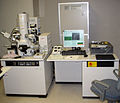In theoretical chemistry, Specific ion Interaction Theory (SIT theory) is a theory used to estimate single-ion activity coefficients in electrolyte solutions...
10 KB (1,422 words) - 13:15, 15 March 2025
atmosphere Electrical double layer Ion association Davies equation Pitzer equation Specific ion Interaction Theory Debye, P.; Hückel, E. (1923). "Zur...
43 KB (7,543 words) - 20:05, 19 March 2025
the Debye–Hückel theory is no longer adequate. They are more rigorous than the equations of specific ion interaction theory (SIT theory), but Pitzer parameters...
18 KB (2,697 words) - 04:42, 16 December 2024
together with Specific ion interaction theory (SIT) and Pitzer equations is important for the understanding of the behaviour of ions dissolved in natural...
7 KB (967 words) - 16:39, 4 January 2024
Intermolecular force (redirect from Dipole-dipole interaction)
London forces but is weaker than ion-ion interaction because only partial charges are involved. These interactions tend to align the molecules to increase...
28 KB (3,468 words) - 17:17, 23 February 2025
Variational transition-state theory — Benson group increment theory — Specific ion interaction theory Climatology: Climate change theory (general study of climate...
38 KB (4,341 words) - 16:45, 7 April 2025
is best known for developing the Brønsted–Lowry acid–base theory; he developed the theory at the same time as (but independently of) Martin Lowry. Brønsted...
7 KB (638 words) - 13:21, 9 January 2025
signal indicating a call did not go through Specific ion interaction theory, a theory for estimation of single-ion activity coefficients Sprint interval training...
3 KB (462 words) - 21:16, 10 June 2024
Activity coefficient (section Ion trios)
such as the Davies equation, Pitzer equations or TCPC model. Specific ion interaction theory (SIT) may also be used. For non-electrolyte solutions correlative...
26 KB (3,627 words) - 03:25, 17 March 2025
Osmotic coefficient Pitzer equations Poisson–Boltzmann equation Specific ion Interaction Theory Salting in Salting out Ionic strength Ionic strength introduction...
7 KB (1,015 words) - 05:46, 11 February 2023
Chemical bond (redirect from Bonding theory)
atoms or ions to form molecules, crystals, and other structures. The bond may result from the electrostatic force between oppositely charged ions as in ionic...
40 KB (4,878 words) - 13:33, 22 September 2024
Debye–Hückel equation or extensions such as Davies equation Specific ion interaction theory or Pitzer equations may be used. However this is not always...
44 KB (6,725 words) - 12:53, 18 March 2025
Focused ion beam, also known as FIB, is a technique used particularly in the semiconductor industry, materials science and increasingly in the biological...
26 KB (3,261 words) - 23:21, 18 April 2025
Waals interactions, as well as hydrogen bonding. More specific proposed interactions include metal-ion, ion-ion, cation-pi and pi-stacking. Interactions can...
22 KB (2,644 words) - 22:45, 4 November 2024
equation Entropy (energy dispersal) Non-random two-liquid model Specific ion interaction theory Thermodynamic activity Tompkins, F. C.; Goodeve, C. F. (1971)...
9 KB (787 words) - 16:47, 9 October 2024
Ion chromatography (or ion-exchange chromatography) is a form of chromatography that separates ions and ionizable polar molecules based on their affinity...
54 KB (6,995 words) - 15:43, 19 January 2025
Coordination complex (redirect from Complex ion stability)
complex ion chain theory. In considering metal amine complexes, he theorized that the ammonia molecules compensated for the charge of the ion by forming...
57 KB (5,547 words) - 23:59, 15 February 2025
space without any further electrical interaction with the thruster. By contrast, electromagnetic thruster ions are accelerated by the Lorentz force to...
87 KB (8,865 words) - 12:14, 15 March 2025
charged species, the gas-phase interaction energy correlates with the ionic radius, r i o n {\displaystyle r_{\mathrm {ion} }} (non-spherical ionic radii...
35 KB (4,104 words) - 20:10, 21 April 2025
strand of only a few ions. Coulomb interactions of increasing complexity will create a more intricate ion configuration if many ions are initialized in...
31 KB (3,589 words) - 09:26, 18 March 2025
column, each at a different velocity, which are a function of specific physical interactions with the adsorbent, the stationary phase. The velocity of each...
89 KB (10,969 words) - 21:02, 3 May 2025
ion. This makes ion traps more suitable for the study of light interactions with single atomic systems. The two most popular types of ion traps are the...
20 KB (2,685 words) - 18:23, 23 February 2025
Spectroscopy (section Nature of the interaction)
originated in the use of phosphor screens to detect ions. Mössbauer spectroscopy probes the properties of specific isotopic nuclei in different atomic environments...
44 KB (4,768 words) - 17:47, 7 April 2025
molecular orbital theory has orbitals that cover the whole molecule. In 1916, G. N. Lewis proposed that a chemical bond forms by the interaction of two shared...
15 KB (1,887 words) - 16:20, 15 March 2025
therefore are discussed also as intermolecular forces. Ionic interactions involve the attraction of ions or molecules with full permanent charges of opposite...
27 KB (3,311 words) - 13:54, 24 February 2025
of the ion while traversing the medium may change frequently, it is very difficult to describe all possible interactions for all possible ion charge states...
30 KB (4,051 words) - 03:14, 28 April 2025
electronically conducting solids to store energy. Li-ion batteries are characterized by higher specific energy, higher energy density, higher energy efficiency...
215 KB (23,012 words) - 02:51, 30 April 2025
Self-energy (category Quantum field theory)
without quantum field theory. In chemistry, the self-energy or Born energy of an ion is the energy associated with the field of the ion itself.[citation needed]...
6 KB (874 words) - 10:35, 26 March 2025
can be calculated using, for example, Pitzer equations or Specific ion interaction theory. Otherwise conditions must be adjusted so that activity coefficients...
44 KB (6,468 words) - 04:51, 23 February 2025
an attraction is generally attributed to an electron-lattice interaction. The BCS theory, however, requires only that the potential be attractive, regardless...
21 KB (2,814 words) - 09:40, 1 November 2024















